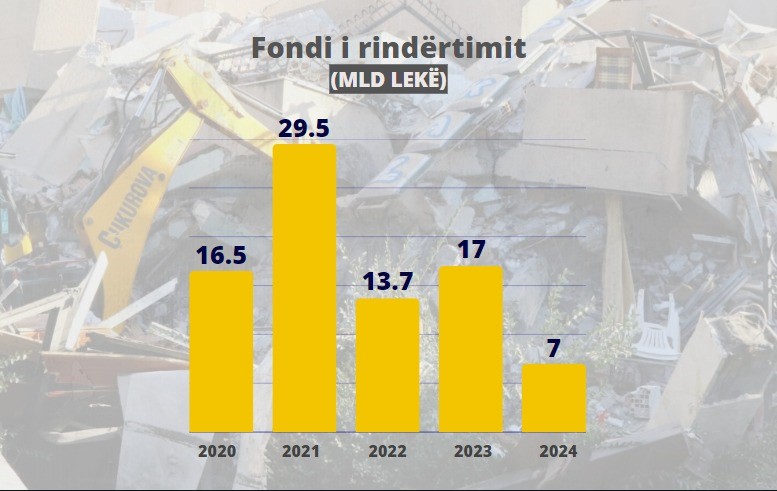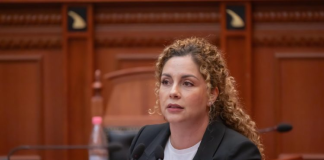Three days after the tragic earthquake of November 26, 2019, Prime Minister Edi Rama pledged to Albanians that homeless families would enjoy reconstructed buildings within 2020. This great promise, followed by others made to unfortunate residents, were serially broken. The process keeps dragging for 4 years now since the earthquake; however, the government does not still give a deadline when saga of affected families enduring the fourth winter out of their homes will end. Albanian taxpayers have paid 83,7 billion ALL for reconstruction, whereas Albanian government ignored the international assistance provided through soft loans.
Esmeralda Topi
A few hours following the devastating earthquake of November 26, 2019 and when thousands of Albanian families found themselves in the middle of a crossroad, Prime Minister Edi Rama pledged to all these homeless families that they would move to their new houses within a year.
“No further discussion should take place within 2020 regarding anyone who lost their home due to earthquake. Everyone should be in better conditions than before the earthquake.”, he promised during the extraordinary government meeting.
(video)
Four years after the devastating earthquake, homeless families keep counting the days without knowing when they will move to their reconstructed houses. Contrary to what has been promised by Rama, the reconstruction process appears to have no end. Following serial violation of promises year by year, the government has still no set deadline for completing reconstruction.
‘Reconstruction process started hastily with great fanfare creating the idea of a competent government that acts quickly in such cases. However, the fact that government allocates money for reconstruction even in the budget of 2024 shows that such process should have been taken more seriously.’, said Agron Haxhimali, Head of Institute for Albanian Municipalities.
Given the circumstances, Haxhimali adds that reconstruction should at least be completed within 2025.
“It is definitely not an easy process, however to end faster, it required a different not so government-focused method of management with other dedicated financial resources.”, concluded Haxhimali.
Burden of reconstruction in the budget
Data provided by Faktoje show that state budget has borne the main burden of reconstruction. Since establishment of reconstruction fund up to November this year, the actual expenses result in 80 billion ALL.
‘28.5 billion ALL for central government units, 52 billion ALL for local self-government units.’, explains Ministry of Finance for Faktoje.

With the last normative act, the government added 12 billion ALL to this year’s budget to finance reconstruction works. Whereas, another 7 billion ALL were added to the fund in the next year budget.
“The reconstruction process exceeded the set deadlines directly affecting products cost increase (construction equipment, services etc.) beyond budget estimates. Increase of prices, increase of loan costs for builders and depreciation of ALL (Albanian Lek) for domestic products were laid over to this progress (which bears strong reasons to believe that allocation of public works was also preferential and clientelistic). This unfavourable situation increased the budget allocation at the end of 2022 and continued throughout 2023 with at least an extra 3 billion ALL where other works out of reconstruction were involved.”, argues the expert Eduard Gjokutaj for Faktoje.
According to the data, the financial burden of Albanian taxpayers for reconstruction reaches 83,7 billion ALL. Meanwhile, the fund is likely to be part of the budget at least during 2025, as the process is not completed with this bill.
Why were soft loans overlooked?
During the donor’s conference for reconstruction in Brussels, EUR 1.15 billion were made available to Albania in the form of grants and soft loans.
“The international community has pledged EUR 1.15 billion for Albania. This is phenomenal. It will fully cover the needs, and I am thrilled about the solidarity that the international community has shown with Albania. “, said the President of the European Commission, Ursula von der Leyen next to Prime Minister Edi Rama in February 2020.
Out of EUR 1.15 billion fund, 750 million were soft loans ignored by the government, thus leaving the reconstruction burden to state budget.
“The government didn’t achieve this as it was unable to allocate funds to its oligarchs and clients, including even elements of organized crime. However, it used budget money which are still insufficient. “, argues Mr. Zef Preçi, Executive Director for Albanian Center of Economic Research.
Data provided by Faktoje shows that from 2020 to July 2023, the government has received 33 credit lines from different international financial institutions. However, none of them is related to reconstruction.
‘History repeats itself as in the case of IPARD funds. If agreed and written regulations are not followed, no donor will give you any money because they are hold accountable to their taxpayers. They have written manuals and regulation whose violation hold accountable anyone certifying money that does not go the destination and are not allocated on the basis of the established regulation thereof’, emphasises Zef Preçi for Faktoje.
If loans were obtained from IMF, EBRD, KFW or World Bank, local authorities would have to follow tender’s strict procedures. However, it’s is true that most contracts were concluded through limited procedure and direct negotiation, under the cloak of emergency.
Conclusion
Based on the gathered information, we categorize Prime Minister Edi Rama’s promise that ‘No further discussion should take place within 2020 regarding anyone who lost their home due to earthquake’ as unfulfilled.






